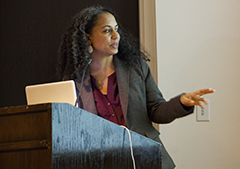 Dr. Na’ilah Suad Nasir (Associate Professor in African American Studies and Birgeneau Endowed Chair in Educational Disparities at the University of California, Berkeley) was invited by the Department of Postsecondary Teaching and Learning to speak about “Identity, Race, and Learning in the Mathematics Classroom and Beyond”. Her presentation focused on how identity and race influence learning, particularly in mathematics. After much research in various underprivileged high schools around California, Dr. Nasir discovered that it is significantly easier for students to remember and perform math problems when they are conceptually related to something (especially something of interest) instead of just applying a mathematical formula. How students see themselves in relation to the problems is critical to the ability to learn effectively. Dr. Nasir’s presentation generated lively discussion between students, staff, and faculty, and provided timely and important information for PsTL and CEHD.
Dr. Na’ilah Suad Nasir (Associate Professor in African American Studies and Birgeneau Endowed Chair in Educational Disparities at the University of California, Berkeley) was invited by the Department of Postsecondary Teaching and Learning to speak about “Identity, Race, and Learning in the Mathematics Classroom and Beyond”. Her presentation focused on how identity and race influence learning, particularly in mathematics. After much research in various underprivileged high schools around California, Dr. Nasir discovered that it is significantly easier for students to remember and perform math problems when they are conceptually related to something (especially something of interest) instead of just applying a mathematical formula. How students see themselves in relation to the problems is critical to the ability to learn effectively. Dr. Nasir’s presentation generated lively discussion between students, staff, and faculty, and provided timely and important information for PsTL and CEHD.
Focusing on parent involvement for immigrant student academic success
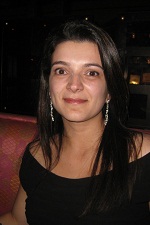 Dr. Marina Aleixo, from the Department of Curriculum and Instruction (Second Languages and Cultures), recently spoke with Tim Post from Minnesota Public Radio about improving immigrant student performance through parent involvement.
Dr. Marina Aleixo, from the Department of Curriculum and Instruction (Second Languages and Cultures), recently spoke with Tim Post from Minnesota Public Radio about improving immigrant student performance through parent involvement.
“If their parent knows about what is going on in school, they’re at home asking their child, ‘What happened in school today? Do you have homework?'” explains Aleixo. “All of these things translate into higher motivation into greater dedication to school.”
Read the story, which covers a range of challenges facing immigrant students in Minnesota, and listen to the full version on featured audio at MPR’s website.
Skovholt receives award for outstanding professional achievement
Educational Psychology professor Tom Skovholt has been selected for the 2012 University of Missouri College of Education Award for Outstanding Professional Achievement.
Tom received the Ph.D. from Missouri in 1974. He was nominated for the award by the Counseling Psychology faculty at Missouri. The award is in recognition of his contributions to counseling research, counseling practice and his teaching of the art and science of counseling as well as his work in international counseling.
The award will be presented at the University of Missouri Reynolds Alumni Center in April.
C&I’s Amy Frederick awarded Mary Alyce and P. David Fellowship in Reading
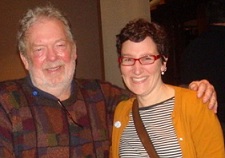 The Department of Curriculum and Instruction is pleased to announce that Amy Frederick, doctoral student in literacy education, is the recipient of the inaugural Mary Alyce and P. David Fellowship in Reading for the 2012-2013 academic year.
The Department of Curriculum and Instruction is pleased to announce that Amy Frederick, doctoral student in literacy education, is the recipient of the inaugural Mary Alyce and P. David Fellowship in Reading for the 2012-2013 academic year.
Dr. P. David Pearson is one of the leading scholars in reading research in the nation, a faculty member and former dean of the Graduate School of Education at the University of California, Berkeley. He received his Ph.D. from the University of Minnesota. This award helps fund Amy’s doctoral studies and her recent attendance at the Literacy Research Association Conference in San Diego, CA. The Mary Alyce and P. David Fellowship in Reading will be awarded annually through the Department of Curriculum and Instruction and the Minnesota Center for Reading Research.
SLC Student, Deqa Muhidin Celebrates Hmong New Year
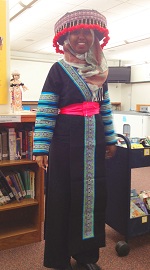 C&I‘s Second Languages and Cultures Initial Licensure Student Deqa Muhidin, dressed in traditional Hmong clothing, celebrates the Hmong New Year at the Phalen Lake Hmong Studies Magnet School where she did her Elementary ESL student teaching.
C&I‘s Second Languages and Cultures Initial Licensure Student Deqa Muhidin, dressed in traditional Hmong clothing, celebrates the Hmong New Year at the Phalen Lake Hmong Studies Magnet School where she did her Elementary ESL student teaching.
“They have an excellent Hmong Studies curriculum. Students at Phalen have the opportunity to explore the Hmong culture, traditions and language… I’ve to admit, they have the best culturally relevant pedagogy I’ve ever seen.”
The Phalen Lake Hmong Studies Magnet is part of the St. Paul Public School District, a TERI Partner. Visit their Hmong Studies page to find out more about their program. Read more about TERI here for more information on the TERI Partner Network.
National survey finds lack of mental health screenings for refugees
 The first national survey of refugee mental health screening practices found that while refugee trauma survivors are at increased risk of developing post traumatic stress disorder (PTSD) and major depression, most states do not provide mental health screenings.
The first national survey of refugee mental health screening practices found that while refugee trauma survivors are at increased risk of developing post traumatic stress disorder (PTSD) and major depression, most states do not provide mental health screenings.
The survey, conducted by researchers from the School of Social Work in collaboration with the State Refugee Health Coordinator and the Center for Victims of Torture (CVT), a St. Paul-based torture survivor rehabilitation center, was recently published in the Journal of Immigrant and Refugee Studies.
“Refugee health coordinators at the state level are in need of short, culturally appropriate mental health screening tools to identify refugees who need assessment and treatment services,” said Patricia Shannon, one of the co-authors of the study and an assistant professor in the School of Social Work.
Of the 25 states that provide a mental health screening, 17 (70.8%) utilize informal conversation rather than standardized measures.
Further, despite the fact that many refugees are fleeing war torn areas, less than half of the states report directly asking refugees about their exposure to war trauma or torture.
The survey also found that states that have a program that advocates, educates, and provides treatment services for survivors of torture are more likely to be aware of and to screen for the devastating effects of war trauma and torture.
“This is a critical finding,” said Shannon. “Providing training to refugee health programs is essential to increasing the mental health screening of refugees. Here in Minnesota, CVT and University researchers are working with the Minnesota Department of Health to develop mental health screening tools and to address how to implement mental health screening as part of the initial refugee health screening exam. I know from my past experience working as a psychologist at CVT that identifying refugees who need mental health care and then connecting them with the services they need is essential to helping them adjust to life in a new community.”
States reported that several barriers are in place to prevent mental health screenings, including lack of culturally sensitive instruments and lack of time and resources.
Health screenings that take place at both private and local public health clinics are typically completed during the course of one to three visits and physicians may have very little time to establish the rapport that is necessary to discuss traumatic experiences or to educate refugee patients about normal reactions to trauma. However, deferring a mental health screening until refugees have established primary care may not be appropriate either as some refugees may not do so until long after they have resettled.
The fact that most refugees have medical coverage through refugee medical assistance or state Medicaid in their first eight months makes it even more imperative that screening and referral for assessment and treatment takes place early in the resettlement process.
“Since recent longitudinal research on the mental health of refugees indicates that the symptoms of trauma can be enduring and debilitating, refugee survivors who go undetected and untreated may end up costing society more through long-term dependence on social security disability income,” said Shannon. “Conversely, mental health screening and referral early in the resettlement process may be essential to supporting healthy adjustment and preventing long-term dependence of refugee trauma survivors.”
In 2010, the United States resettled more than 73,000 refugees from 20 countries. The federal Refugee Act of 1980 entitles newly arrived refugees to a comprehensive health assessment and referral to health services.
Researchers find early reading, executive function skills key for homeless children to succeed
Researchers at the College of Education and Human Development’s Institute of Child Development (ICD) found that early reading and executive function skills are key indicators of academic success for homeless and highly mobile (HHM) children. Both studies were published in the journal Educational Researcher, as part of a special section that underscores the scope and significance of achievement problems related to residential and school instability, while also looking at factors of resilience among HHM children.
Addressing the needs of homeless children is a growing imperative for school districts across the country. Over 1 million students were identified as homeless in the most recent data reported by the National Center for Homeless Education at the Department of Education.
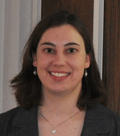 Findings from a longitudinal study led by research associate Janette Herbers (photo right) used administrative data from 18,000 students in Minneapolis Public Schools to indicate that achievement gaps are present in first grade reading scores, with HHM students at even higher risk than children who qualify for free lunch based on low-income status but have never been identified as homeless or highly mobile. Reading scores in first grade predicted later achievement in grades 3 to 8 on standardized tests of reading and math, both for level of achievement and learning rate over time.
Findings from a longitudinal study led by research associate Janette Herbers (photo right) used administrative data from 18,000 students in Minneapolis Public Schools to indicate that achievement gaps are present in first grade reading scores, with HHM students at even higher risk than children who qualify for free lunch based on low-income status but have never been identified as homeless or highly mobile. Reading scores in first grade predicted later achievement in grades 3 to 8 on standardized tests of reading and math, both for level of achievement and learning rate over time.
Reading well in first grade is particularly beneficial for high-risk children, showing a protective effect on later learning.
“While early reading skills are clearly important for the later achievement of all students,” Herbers said, “they are even more important for the success of students whose future achievement is threatened by homelessness and extreme poverty.”
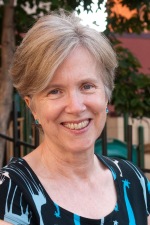 Executive function skills were studied as a potential resilience factor for homeless children in a study led by Ann Masten (photo right) and colleagues from the U of M. These neurocognitive skills, which include voluntary control of attention, flexible thinking, memory, and self-control, are important for learning and getting along with peers and teachers at school.
Executive function skills were studied as a potential resilience factor for homeless children in a study led by Ann Masten (photo right) and colleagues from the U of M. These neurocognitive skills, which include voluntary control of attention, flexible thinking, memory, and self-control, are important for learning and getting along with peers and teachers at school.
The study tested 138 five and six-year-old children on site in three emergency shelters for families during the summers of 2008 and 2009. Scores from a battery of these tasks proved to be broadly predictive of later academic achievement and school adjustment reported by kindergarten and first grade teachers of the children, with unique and distinctive effects compared to traditional IQ measures.
“These findings together with other recent research on executive function skills are exciting,” said Masten, an ICD professor and expert on resilience, has studied homeless families since 1989. “There is growing evidence that these skills can be improved through targeted practice and early education.”
Masten is now working closely with a team of faculty and preschool teachers from the university, community educators, and shelter providers to develop preschool interventions to boost executive function skills as a strategy for promoting school success.
“Both studies [mentioned above] help us to better understand and respond to the strengths, challenges and special needs of our preschool learners who are homeless,” said Elizabeth Hinz of Minneapolis Public Schools. “We can differentiate educational and social supports to develop new services that will support children’s healthy development to ensure they are ready to be successful in school.”
“If we are serious about breaking the cycle of poverty for homeless and highly mobile children, we must focus on their executive functioning skills and emotional resiliency,” Daniel Gumnit, CEO and executive director of People Serving People, which partners with the U of M team and Minneapolis Public Schools on this effort. “This collaborative work helps us prepare the homeless preschoolers in our shelter for kindergarten and sets them up for a greater chance of success in the long run.”
The special section in Educational Researcher includes both U of M studies along with research from Vanderbilt University and the University of Pennsylvania, plus commentary on the topic from John Buckner, a leading scholar in this area on the faculty at Harvard University. Read the special section.
In October, ICD researchers, including Masten, had a first-of-its-kind study published in Child Development that found persistent achievement gaps for reading and math related to homelessness and high mobility.
Educational Researcher is one of six highly ranked peer-reviewed journals published by the American Educational Research Association (AERA).
Register Now! Life Discovery- Doing Science
Life Discovery- Doing Science
Exploring Biology for a Changing World
March 15-16, 2013- St. Paul, Minnesota
Join us to transform Biology Education for the 21st Century
Explore digital resources and new technologies for data exploration & curriculum design in biology education.
To Register and learn more about Life Discovery please visit: http://www.esa.org/ldc/
Registration Deadlines:
Early Bird Rates: 12/15/2012
Advance Rates: 2/28/2013
Earn Continuing Education Units!
Professor Lee Galda writes about motivating kids to read
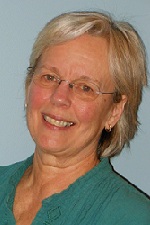 What’s the best way to motivate children to read? That’s the topic of a new CEHD Vision2020 blog post by Lee Galda, Marguerite Henry Professor of Children’s Literature in the Department of Curriculum and Instruction.
What’s the best way to motivate children to read? That’s the topic of a new CEHD Vision2020 blog post by Lee Galda, Marguerite Henry Professor of Children’s Literature in the Department of Curriculum and Instruction.
“A child connects with a book by being an active reader and engaging with a text,” writes Galda. “Active reading involves creating meaning from text and is influenced by a child’s knowledge, experience, personality and beliefs.”
Galda describes this process as the transactional theory of reading: “When reading is approached from a transactional theory perspective, children are more likely to engage in reading. Many students are turned off by books because they’ve often been taught that there is one right answer to questions about a book, or they’re being asked questions that don’t require them to think in-depth.”
Read the blog post.
iPad Initiative: Mini-documentaries and critical issues explored
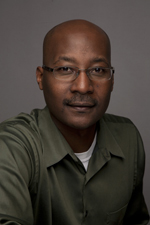
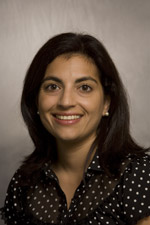 Eric Ringham, MPR commentary editor, and Toni Randolph, award-winning MPR journalist and editor for New Audiences, were guests in Rashné Jehangir and Na’im Madyun’s PsTL 1525W First Year Inquiry course. Jehangir and Madyun, associate professors in the Department of Postsecondary Teaching and Learning, are co-teaching their sections of FYI with a thematic focus on Stories as Game Changers. Students are using iPads to film mini-documentaries around three themes: the American Dream, Home and Place, and Critical Moments in the Twin Cities.
Eric Ringham, MPR commentary editor, and Toni Randolph, award-winning MPR journalist and editor for New Audiences, were guests in Rashné Jehangir and Na’im Madyun’s PsTL 1525W First Year Inquiry course. Jehangir and Madyun, associate professors in the Department of Postsecondary Teaching and Learning, are co-teaching their sections of FYI with a thematic focus on Stories as Game Changers. Students are using iPads to film mini-documentaries around three themes: the American Dream, Home and Place, and Critical Moments in the Twin Cities.
The collaboration with MPR and the Ringham and Randolph visit provided students with the opportunity to gain insights about shaping a narrative, interviewing participants, and to have questions answered about their individual documentary topics. The mini-documentary assignment seeks to use iPad technology to invite students to explore critical issues in Twin Cities communities.
STEM Day Conference 2013
Save the Date!
February 14, 2013
University of Minnesota
Continuing Education and Conference Center
St. Paul, MN
The conference sessions will focus on building partnerships and resources that support and advance K12 STEM Education in Minnesota.
We proudly announce our keynote speaker, Dr. Anthony Murphy (pictured right), newly appointed director of The GLOBE Program. Prior to his current position, Dr. Murphy served as the executive director of the National Center for STEM Elementary Education at St. Catherine University in St. Paul, Minnesota.
Watch for registration and session information soon!
CEHD Reads and author Wes Moore highlight first-year experience
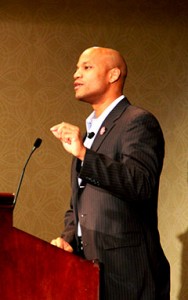 Each year the First Year Experience Program in the Department of Postsecondary Teaching and Learning partners with CEHD Reads to bring the author of the annual FYE Common Book to campus to talk to first-year students and the college community. This year students were excited to welcome Wes Moore, author of The Other Wes Moore, to campus on Nov. 16.
Each year the First Year Experience Program in the Department of Postsecondary Teaching and Learning partners with CEHD Reads to bring the author of the annual FYE Common Book to campus to talk to first-year students and the college community. This year students were excited to welcome Wes Moore, author of The Other Wes Moore, to campus on Nov. 16.
Wes Moore is a Rhodes Scholar, a veteran of combat in Afghanistan, and served as Special Assistant to Secretary of State Condoleezza Rice. These accomplishments, however, are not at the center of the story he tells in his book, which instead focuses on his childhood growing up in Baltimore and the Bronx. The Other Wes Moore examines the barriers and challenges adolescents face growing up in impoverished and violent neighborhoods.
By highlighting the importance of context, as well as the role of mentors, community, and service, Moore spoke to many of the issues students have been exploring as they study his book in their First Year Inquiry course. The author used his time with the college community to inspire students to “make a difference.” Moore — a charismatic and engaging speaker — emphasized that “everybody has a shot at something bigger than where they started from” and that it is our duty to take responsibility for others as well as ourselves if we want to build a stronger community.
Warren Spannaus speaks about politics and citizenship
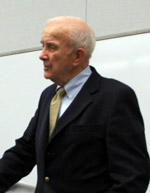 Warren Spannaus, Minnesota Attorney General from 1971 to 1983 and former Democratic candidate for governor, spoke to Gary Peter and Karen Miksch’s PsTL 1246 Engaging Citizenship and Democracy students. Mr. Spannaus talked about important U.S. Supreme Court decisions as well as issues related to the outcome of the recent election, including the ongoing debate about whether the Electoral College should be discontinued. He also discussed the two proposed constitutional amendments (voter ID and same-sex marriage) that were on the ballot, the political factors that led to their defeat, and the recent change in party control of the Minnesota legislature. Mr. Spannaus stressed to students the importance of their individual votes and understanding the structure and power of government. The decisions made by elected officials can have a much longer effect than the time an individual may serve in office.
Warren Spannaus, Minnesota Attorney General from 1971 to 1983 and former Democratic candidate for governor, spoke to Gary Peter and Karen Miksch’s PsTL 1246 Engaging Citizenship and Democracy students. Mr. Spannaus talked about important U.S. Supreme Court decisions as well as issues related to the outcome of the recent election, including the ongoing debate about whether the Electoral College should be discontinued. He also discussed the two proposed constitutional amendments (voter ID and same-sex marriage) that were on the ballot, the political factors that led to their defeat, and the recent change in party control of the Minnesota legislature. Mr. Spannaus stressed to students the importance of their individual votes and understanding the structure and power of government. The decisions made by elected officials can have a much longer effect than the time an individual may serve in office.
2012 Dissertation Fellowship Award recipients in Reading Education and Children’s Literature announced
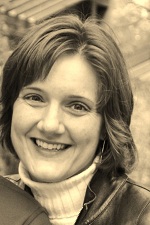
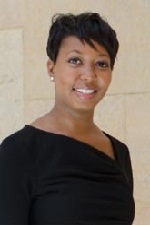 The Department of Curriculum and Instruction is pleased to announce the winners of two fellowship award competitions, held each fall for PhD students in reading education and children’s literature. The recipients are:
The Department of Curriculum and Instruction is pleased to announce the winners of two fellowship award competitions, held each fall for PhD students in reading education and children’s literature. The recipients are:
Lauren Causey: 2012 Norine Odland Endowment for Children’s Literature Fellowship. Lauren’s advisor is Dr. Lee Galda.
Kristen Nichols-Besel: 2012 Schreiner Reading Fellowship. Kristen’s co-advisors are Dr. David O’Brien and Dr. Lee Galda.
Congratulations to Lauren and Kristen!
The Robert Schreiner Reading Fellowship competition is open to Ph.D. candidates in reading education who have completed course work, written and oral comprehensive examinations, and have an approved dissertation proposal. The $2,500 fellowship is designed to support the candidate’s dissertation research in reading education. It is non-renewable. Awardees are selected based of the importance of the research, the clarity with which it is described, the potential the work has for making a significant contribution to the field, and the probability that the research will be completed in a timely manner.
The Norine Odland Endowment for Children’s Literature Fellowship is available to PhD and MA candidates in children’s and adolescent literature who have completed all preliminary course work and examinations, and have had a dissertation or thesis proposal for research in children’s literature approved. The Award grants $2,000 to support dissertation research and $4,000 to support the purchase of books for children and young people in the Fairview University/Amplatz Children’s Hospital. Awardees are selected based of the importance of the purpose for which he/she plans to use the award, the strength of his or her teaching or library experience, his or her expertise in selecting books for children, and the strength of his or her graduate work, particularly that in children’s literature.
McNair Scholars present at the National McNair Research Conference
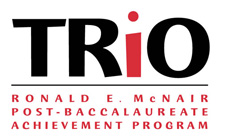 Congratulations to the eight TRiO Ronald E. McNair Scholars who presented their 2012 summer research this month at the 21st Annual National McNair Research Conference and Graduate Fair in Lake Geneva, WI. More than 300 McNair Scholars from across the country attended. The conference included an information fair with over 50 of the country’s top graduate schools, graduate school workshops, and networking activities. The presenters were: Christopher Crump, Bezaleel Gebru, Jewel Jeweletter, Biftu Khalif, Touhue Ly*, Merone Melekin, Amy Neguse* and Carlos Reyes* (*asterisk denotes a scholar mentored by a CEHD faculty member). View all of the McNair Scholars research projects.
Congratulations to the eight TRiO Ronald E. McNair Scholars who presented their 2012 summer research this month at the 21st Annual National McNair Research Conference and Graduate Fair in Lake Geneva, WI. More than 300 McNair Scholars from across the country attended. The conference included an information fair with over 50 of the country’s top graduate schools, graduate school workshops, and networking activities. The presenters were: Christopher Crump, Bezaleel Gebru, Jewel Jeweletter, Biftu Khalif, Touhue Ly*, Merone Melekin, Amy Neguse* and Carlos Reyes* (*asterisk denotes a scholar mentored by a CEHD faculty member). View all of the McNair Scholars research projects.
The McNair program is actively recruiting scholars for summer 2013. Learn more about the program and application process.
Diversity Dialogue: Alexs Pate and Constructing the Innocent Classroom
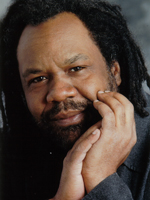 For the next C&I Diversity Dialogue event, Alexs Pate will present “Constructing the Innocent Classroom: Rethinking Teacher-Student Relationships.”
For the next C&I Diversity Dialogue event, Alexs Pate will present “Constructing the Innocent Classroom: Rethinking Teacher-Student Relationships.”
Friday, November 16, 2012
Noon – 1:30 pm
Peik Hall Room 355
Pizza will be served.
Throughout his career, the issues of guilt and innocence, especially as they impact people of color, have preoccupied much of Alexs Pate’s writing and scholarship. He has developed a program that approaches academic performance by addressing the capacity of public schools to engage the innocence of their children. In this effort, he takes teachers beyond the boundaries of cultural proficiency and cultural competency and helps them understand better the way our society has burdened our children – especially children of color – with the weights of low expectation, stereotypes and negative narratives. Implemented in Omaha Public Schools,The Innocent Classroom helps teachers create more accurate and efficacious relationships with the goal of improving academic performance.
Alexs Pate is Assistant Professor in African American and African Studies at the University of Minnesota, where he teaches courses in writing and black literature, including a course on “The Poetry of Rap.” Pate is the author of five novels including New York Times bestseller Amistad, commissioned by Steven Spielberg’s Dreamworks/SKG and based on the screenplay by David Franzoni. His other novels are Losing Absalom, Finding Makeba, The Multicultiboho Sideshow, and West of Rehoboth.
CAREI Researchers Present at Mid-Western Educational Research Association Conference
 CAREI research associates Beverly Dretzke, Debra Ingram, and Tim Sheldon each presented at the Mid-Western Educational Research Association (MWERA) annual conference, held this year in Evanston, IL. Much of the research resulted from collaboration with community partners. Two of Dretzke’s coauthors, Judy Meath and Susan Rickers, had previously worked as graduate student research assistants at CAREI.
CAREI research associates Beverly Dretzke, Debra Ingram, and Tim Sheldon each presented at the Mid-Western Educational Research Association (MWERA) annual conference, held this year in Evanston, IL. Much of the research resulted from collaboration with community partners. Two of Dretzke’s coauthors, Judy Meath and Susan Rickers, had previously worked as graduate student research assistants at CAREI.
The research presented by Dretzke, Ingram, and Sheldon covered a wide range of educational topics, specifically:
• Staying Power: Assessing the Impact of the be@school Program on Student Attendance Behavior. (Sheldon, T. D.)
• Integrating the Arts to Improve Student Learning.
(Ingram, D., & Weiss, C.)
• How Practice and Evaluation Shape Each Other: An Example from an Arts Integration Project.
(Radzicki, E., & Dretzke, B. J.)
• Be an Artist with Your Words: Integrating Instruction in Language Arts and Visual Arts.
(Ingram, D., & George, A.)
• Summer School Partnerships of Literary Artists and Sixth-Grade Reading Teachers.
(Dretzke, B. J., Meath, J. L., & Rickers, S. R.)
FYI Common Book Event: Pathways for Youth: Individual and Institutional Factors
As part of this year’s Common Book events, PsTL First Year Inquiry students attended the Pathways for Youth: Individual and Institutional Factors panel discussion. Five invited panelists presented their work with youth centered research and programs. Each panelist shared their approach to supporting youth develop and understanding the issues and barriers youth face. Sondra Samuels’ work with the Northside Achievement Zone takes a space based approach to address the achievement gap in her community. Ann Masten’s research takes a strength based approach to understanding youth and how to nurture resilience. Sarah Walker’s work with 180 Degrees takes an issue based approach that provides both direct service and advocates for policy reform in the juvenile justice system.
The discussion among the panelists provided CEHD’s first year students a window into a variety of ways to make a different in the lives of young people. One common theme that emerged from the discussion was the importance of setting positive expectations for individuals and communities. Each panelist shared their passion for working with youth and their personal journeys that led them to their current work. Students were interested in hearing how panelists maintained their passion for work that is sometimes very demanding. Panelists described keeping “the fire” alive by staying connected to the communities they work in, building strong networks of support for themselves, and celebrating their successes.
We thank the panelists for their participation in our FYI program. The panelists included Steve Randall (St. Paul Parks and Recreation), Mike Baizerman (Youth Studies, Professor), Sondra Samuels (Northside Achievement Zone, CEO), Ann Masten (Institute of Child Development, Professor), Sarah Walker (Chief Administrative Officer, 180 Degrees).
African American Read-In welcomed Mbulelo Mzamane
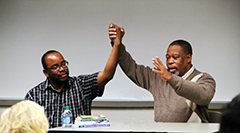 Ezra Hyland, teaching specialist in the Department of Postsecondary Teaching and Learning brought Mbulelo Mzamane to speak with University faculty, staff, and students last week. Mzamane is a well-known author, academic, and activist from South Africa who made post-apartheid changes alongside former South African President Nelson Mandela.
Ezra Hyland, teaching specialist in the Department of Postsecondary Teaching and Learning brought Mbulelo Mzamane to speak with University faculty, staff, and students last week. Mzamane is a well-known author, academic, and activist from South Africa who made post-apartheid changes alongside former South African President Nelson Mandela.
Mzamane told inspiring stories of his time in South Africa serving with Mandela and energized lively discussion between students and staff on current political issues. Revolution and change, he said, is not something that requires bloodshed. Economic and social reconstruction cannot be achieved through military power, but through politics and the cooperation of the people. “Cooperation is the only way to grow ourselves,” Mzamane said, one of many inspirational and thought-provoking statements. To further explore South Africa’s struggle against apartheid, Hyland suggested Mzamane’s trilogy The Children of Soweto and The Children of Paradise.
McMaster presents at National Special Education Congress in Turkey
 Kristen McMaster, associate professor in Educational Psychology, recently gave a plenary talk at the 22nd National Special Education Congress at Karadeniz Technical University in Trabzon, Turkey. Her talk, “Assessment for Instructional Decision-Making: Curriculum-Based Measurement,” provided an overview of the work on CBM initiated by Professor Emeritus Stanley Deno at the U of M, described how CBM can be used for data-based individualized instruction, and highlighted McMaster’s recent work on CBM in writing.
Kristen McMaster, associate professor in Educational Psychology, recently gave a plenary talk at the 22nd National Special Education Congress at Karadeniz Technical University in Trabzon, Turkey. Her talk, “Assessment for Instructional Decision-Making: Curriculum-Based Measurement,” provided an overview of the work on CBM initiated by Professor Emeritus Stanley Deno at the U of M, described how CBM can be used for data-based individualized instruction, and highlighted McMaster’s recent work on CBM in writing.
Along with her colleague, Dr. Stephanie Al Otaiba from Southern Methodist University in Dallas, TX, McMaster spoke with special education faculty and students about current special education practices in the US and Turkey, and toured two schools in Trabzon.
